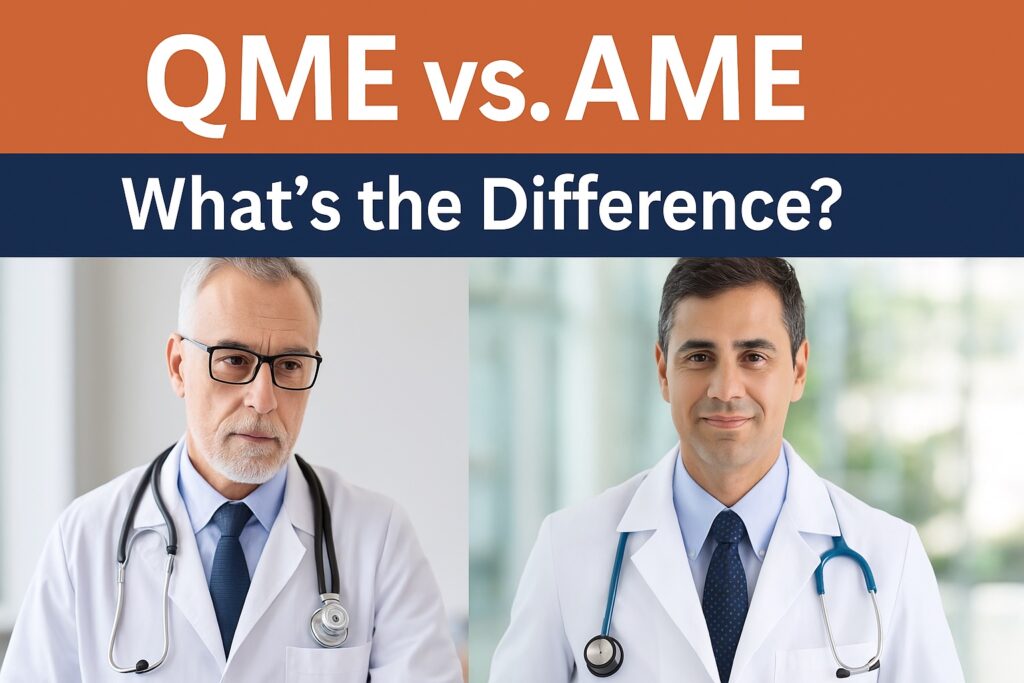
If your workers’ compensation case involves a dispute about your injury, you may need a medical-legal evaluation. In California, this typically means an exam with a Qualified Medical Evaluator (QME) or an Agreed Medical Evaluator (AME). But what’s the difference — and which one is better for your case?
Choosing the right path can directly impact your disability rating, your ability to return to work, and how much compensation you ultimately receive.
🔹 What Is a QME?
A Qualified Medical Evaluator (QME) is a doctor certified by the California Division of Workers’ Compensation (DWC) to examine injured workers and resolve disputes about:
- Whether your injury is work-related
- The extent of your permanent disability
- Whether you’ve reached Maximum Medical Improvement (MMI)
- Work restrictions and future care needs
- Apportionment to pre-existing conditions
QMEs are selected from a state-issued panel based on specialty. If you’re unrepresented, you can request one directly. If you’re represented by an attorney, your lawyer can help strike names from a panel or negotiate an alternative.
🔹 What Is an AME?
An Agreed Medical Evaluator (AME) is a doctor both sides (you and the insurance company) agree to use instead of a QME panel. This typically happens when you are represented by an attorney and both sides want a specific expert to conduct the evaluation.
Key points about AMEs:
- Only available if you have legal representation
- Considered highly persuasive by judges
- Often used in complex or high-stakes cases
- Must be mutually agreed upon by both parties
⚖️ QME vs. AME: Key Differences
| Feature | QME | AME |
|---|---|---|
| Who Chooses | State panel (randomized) | Both sides agree |
| Attorney Required? | No | Yes |
| Judge Preference | Less persuasive | More persuasive |
| Flexibility | Limited to panel selection | Can choose best-fit doctor |
| Used When | No agreement between parties | Parties can agree on expert |
🧠 Why the Evaluator You Choose Matters
Your medical-legal evaluator’s opinion can influence:
- Your permanent disability rating
- The amount of compensation you’re owed
- Access to future medical care
- Your ability to return to work or qualify for vocational rehab
Once the report is issued, it becomes difficult (but not impossible) to challenge. That’s why choosing the right evaluator up front is so critical.
🛡️ How EFLL Helps With QME and AME Strategy
At Employees First Labor Law, we:
✅ Help injured workers select the best possible QME specialty
✅ Negotiate with insurance companies to use respected AMEs
✅ Prepare clients for their evaluations so the report is accurate
✅ Dispute flawed reports or request supplemental opinions
✅ Coordinate your medical record, legal arguments, and strategy for maximum impact
Whether you go the QME or AME route, we make sure your voice is heard — and your injury is taken seriously.
👉 Learn more: How to Dispute a Biased QME or AME Report
👉 Explore: How to Choose the Right QME in Your Workers’ Comp Case
🔹 Why Choose Employees First Labor Law?
Most injured workers don’t realize how much power they have in shaping their case — especially when it comes to choosing the right medical evaluator. Insurance companies count on that. They hope you’ll go through the process blindly, accept low disability ratings, and settle for less than you deserve.
At Employees First Labor Law, we make sure that never happens.
Our team brings a rare and powerful combination of experience in California workers’ compensation law and high-level civil litigation. This allows us to approach your case from every angle — protecting your workers’ comp rights while identifying opportunities for larger third-party claims when available.
We don’t just guide you through the QME or AME process. We:
✅ Strategically evaluate whether a QME or AME is better for your specific situation
✅ Fight to ensure your permanent disability rating reflects your real limitations
✅ Challenge biased or incomplete medical reports with evidence and legal precision
✅ Push for future medical care and long-term benefits, not just a quick payout
✅ Coordinate with respected medical professionals to document your case thoroughly
You’ve got one shot to get this right — and we make sure it counts.
Contact EFLL today for a free consultation. We’ll help you understand your options, avoid costly mistakes, and secure the compensation and care you’re truly entitled to.



